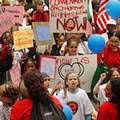美國,紐約州,紐約市,2002年5月10日(ENS)-由三個聯合國機構於週四(5/8)發表的新研究結論指出,全世界每天有約5,500位兒童死於因污染的水、空氣與食物所導致的疾病。在這份報導中,詳細描述了環境惡化對這群地球上最脆弱居民的致命威脅。

數百名兒童在週三的保護兒童權力遊行活動中走過曼哈頓的街道,其中的訴求包括兒童擁有乾淨環境的權力。(攝影:唐納‧迪西薩,版權歸屬:聯合國兒童基金會)
在這篇「環境對健康的衝擊:新千禧年的兒童」報告中指出,環境中的病菌污染造成兩大引起兒童死亡的主因:腹瀉與急性呼吸道感染。
報告中點出,雖然過去十年來兒童福利與環境都有所改善,但是每天依然有數千名兒童死於與環境污染相關的疾病。
聯合國兒童基金會(UNICEF)的執行主席貝拉米(Carol Bellamy)說:說:「過去十年來我們有長足的進步,今日的兒童更健康,也有更乾淨的水。」

聯合國兒童基金會(UNICEF)的執行主席貝拉米(照片提供:聯合國兒童基金會)
但是她補充:「但是令人不安的事實顯示,我們幾乎還沒有開始處理一些主要的問題。有太多的兒童,只要有乾淨的水和衛生設備可用,即可避免死於疾病。」
這份厚達140頁的報告是由聯合國兒童基金會、聯合國環境規劃署(UNEP)和世界衛生組織(WHO)共同完成的。為期三天的聯合國大會在週三(5/7)於紐約舉行,其中特別的議題是「兒童」,而這份報告就在大會中發表。
超過60位以上的國家或政府領導人與170位各國代表參與此會,目標是將兒童置於目前工作的首位,並且投入更多在兒童所需要的社會服務上。其中的目標之一就是更多家庭能夠有衛生下水道,並且有能力取得乾淨的飲用水。
在這份聯合國的報告中,指出許多環境問題直接影響兒童,像是大量的有毒化學物質與環境資源的枯竭。例如環境中的鉛(大部分由燃燒含鉛汽油引起),會造成兒童永久的神經與發育障礙。

兒童論壇的一位女童代表。(攝影:蘇珊‧馬其斯,版權歸屬:聯合國兒童基金會)
數百萬名兒童在田地裡工作,暴露在高危險的農藥中。報告中警示:兒童在全球的環境問題中也顯得特別脆弱,例如氣候變遷的衝擊、臭氧層稀薄化和全球生物多樣性減少。
NEW YORK, New York, May 10, 2002 (ENS) - About 5,500 children die each day around the world from diseases caused by polluted air, water and food, concludes a new study released Thursday by three United Nations agencies. The report details the deadly threat that environmental degradation poses to the Earth's most vulnerable citizens.

Hundreds of children paraded through the streets of Manhattan on Wednesday in a march for child rights - which include the right to a clean environment. (Photo by Donna DeCesare UNICEF)
Environmental contamination gives rise to a number of diseases, including diarrhea and acute respiratory infections - two of the leading causes of child mortality - charges the report, "Children in the New Millennium: Environmental Impact on Health."
The study notes that thousands of children continue to die every day from pollution related diseases, despite improvements made over the past 10 years in both children's well being and the environment.
"We have made great strides over the last decade," said Carol Bellamy, executive director of the UN Children's Fund (UNICEF). "Children are healthier today. There is more access to clean water."

Carol Bellamy, executive director of UNICEF. (Photo courtesy UNICEF)
"But these disturbing figures show we have barely started to address some of the main problems," Bellamy added. "Far too many children are dying from diseases that can be prevented through access to clean water and sanitation."
The 140 page report was produced by UNICEF, the UN Environment Programme (UNEP) and the World Health Organization (WHO). It was released in conjunction with the three day United Nations (UN) General Assembly special session on children, which opened in New York on Wednesday.
The conference, attended by more than 60 heads of state or government and 170 national delegations, aims to place children at the top of the world's agenda and foster more investment in essential social services for them. One of its main goals is to increase household access to hygienic sanitation facilities and affordable and safe drinking water.
The UN report identifies a number of environmental problems that directly affect children, such as high levels of toxic chemicals and the degradation and depletion of natural resources. For example, lead contamination in the environment - much of it from leaded gasoline - causes permanent neurological and developmental disorders in children.

A girl delegate at the Children's Forum. (Photo by Susan Markisz UNICEF)
Millions of children work in agriculture, putting them at high risk of pesticide poisoning. Children are also disproportionately vulnerable to global environmental problems, such as the impact of climate change, the depletion of the ozone layer, and the loss of the planet's biological diversity, the report warns.
【文章連載】
■聯合國:每天有數千名兒童死於污染 (上) (下)
全文與圖片詳見:http://ens-news.com/ens/may2002/2002-05-10-06.asp
摘要翻譯請見:http://news2.ngo.org.tw/php/ens.php?id=02051001
版權歸屬Environment News Service(ENS)




